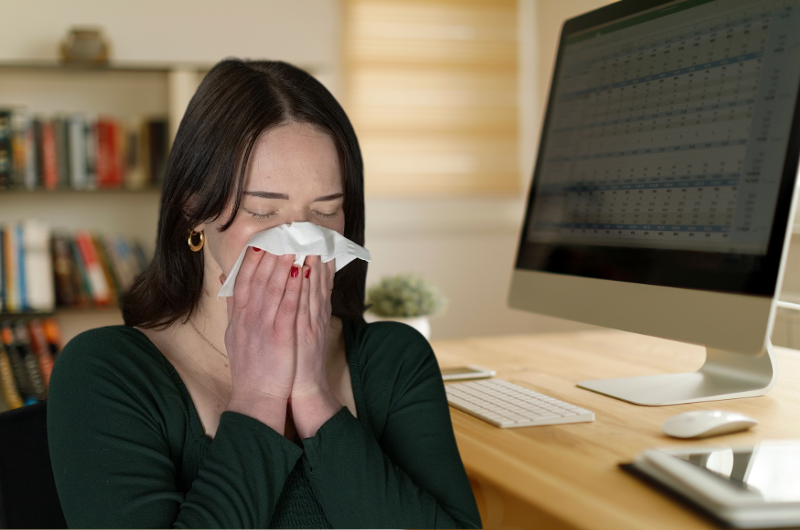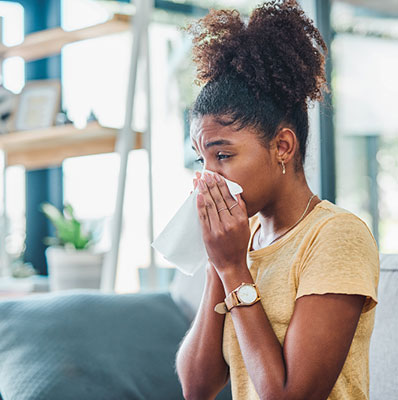Cold Virus: How Long Are You Contagious?

February 26, 2024
You’re excited to see friends, then bummed to get a cold, that unwanted disruption. How long should you wait to reschedule to avoid people while you’re contagious?
Most people recover from the common cold within a week or two; postponing two weeks reduces your chances of getting someone sick.
“When a patient comes in with cold symptoms, we say they should feel better in five or seven days,” says Hyokyung Sung, M.D., a family medicine physician in Fort Lee, New Jersey. “That’s the average – but it can linger for up to two weeks.”
Colds are caused by viruses, similar to the flu, COVID-19 or respiratory syncytial virus (RSV). If you avoid people who have colds, you can’t catch the virus from them.
“The virus that causes a cold is spread by airborne droplets when you cough, sneeze or talk,” Dr. Sung says. “Tiny droplets coming out of your mouth or nose make contact with another person, and they breathe them in.”
Hundreds of different viruses are known to cause the common cold. Many are rhinoviruses, a type of virus commonly linked to colds.
“As it is not always medically necessary to test for colds, we might not know which virus is causing cold-like symptoms,” Dr. Sung says.
What to Do When You Have a Cold
You likely know the symptoms of a cold: stuffy nose, sore throat, sneezing, coughing. A fever isn’t typical – that’s more likely to be the flu, RSV or COVID-19.
You may be contagious before you even know that you have a cold. During an incubation period, you’ve caught the virus, but you don’t have symptoms yet.
Once your symptoms start appearing, you’ll realize you have a cold. To keep friends, relatives and colleagues healthy, avoid spreading the virus while you’re contagious.
“Limit in-person contact with others as much as possible,” Dr. Sung says. “Some in-person activities are necessary, while others are not.”
If there’s an event that you need to attend while you have a cold:
- Wear a mask. Covering your nose and mouth with a disposable mask limits the spread of illness. It also reduces your chances of catching a cold from others, if you’re healthy.
“It’s a barrier to protect you from inhaling those contagious droplets,” Dr. Sung says.
- Wash your hands often. Practicing good hand hygiene decreases the chance that you’ll spread your cold to others. You should wash your hands after coughing, sneezing or blowing your nose.
“People do a lot of unconscious behaviors with their hands,” Dr. Sung says. “They touch their nose or face, then touch items that people might use, causing the spread.”
You can wash with soap and water or with hand sanitizer. Both options should help eliminate viruses from your hands.
“Hand sanitizer with alcohol kills viruses,” Dr. Sung says. “Handwashing doesn’t kill the virus, but it washes the virus away, off your hands.”
- Stop sharing certain items with others. Don’t share cups, utensils or food with your partner or children during your cold. You may want to use separate hand towels, as well.
“Don’t share anything that comes into contact with your nose or mouth,” Sung says.
- Take care of yourself. Eat a healthy and balanced diet, hydrate yourself and get enough sleep. These simple lifestyle habits help your immune system fight off cold viruses.
“Stay hydrated, drinking warm water or other comforting drinks,” Dr. Sung says. “Honey is a natural cough suppressant, so I tell patients to drink tea with honey, unless they have diabetes.”
How to Tell That You Aren’t Contagious Anymore
Notice how you're feeling a week or so after you get a cold. Are you still coughing, sneezing or congested, or are your symptoms gone?
“I usually tell my patients, ‘If the symptoms are getting better, you’re less likely to be contagious, but there’s always a risk,’” Dr. Sung says.
Most cold symptoms fade within one or two weeks, but coughs can last longer. Your cough may linger for a month, but it doesn’t mean you’re contagious.
“If you don’t have other symptoms, the cough may be the body’s response to the cold,” Dr. Sung says. “The body’s response includes inflammation, which might still be there after the virus is killed, which is why you’re having the cough.”
Next Steps & Resources:
- Meet our source: Hyokyung Sung, M.D.
- Make an appointment online with Dr. Sung or a doctor near you, or call 800-822-8905.
- Learn more about our primary care services.
The material provided through Healthier You is intended to be used as general information only and should not replace the advice of your physician. Always consult your physician for individual care.







